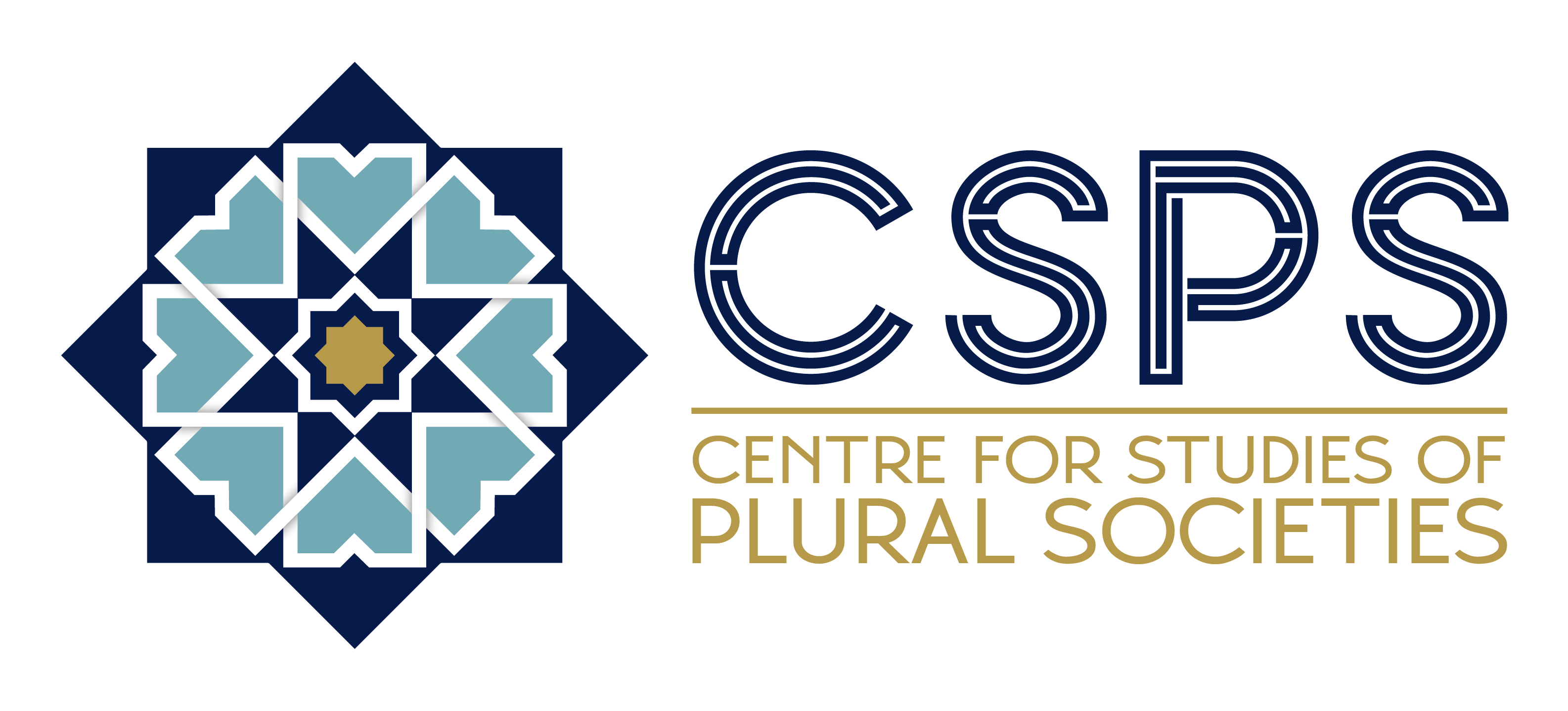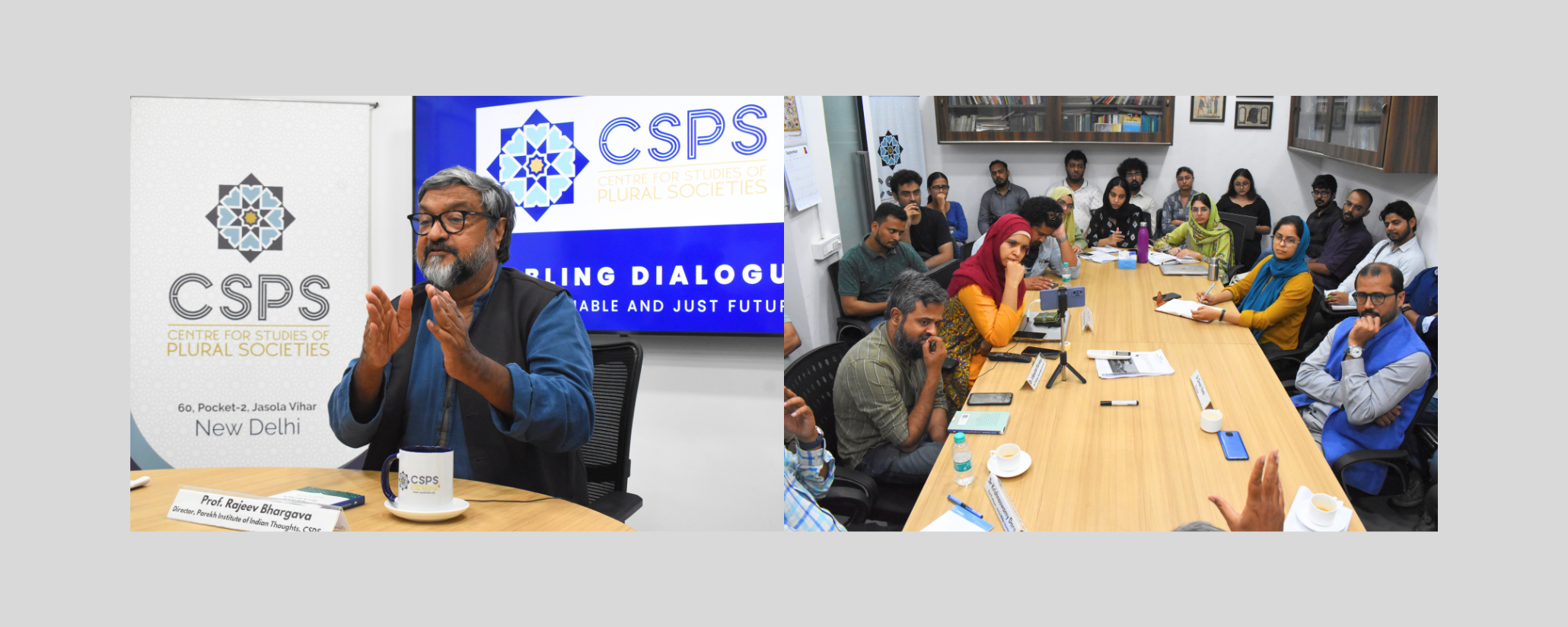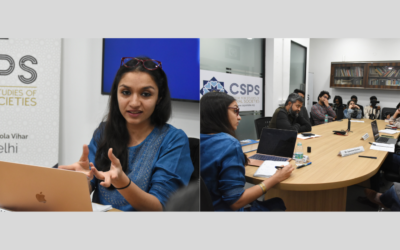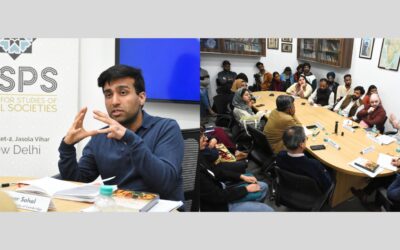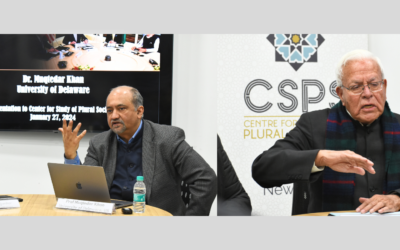The Centre for Studies of Plural Societies (CSPS) organised a Book Discussion on Reimagining Secularism in India authored by Prof. Rajeev Bhargava (Director, Parekh Institute of Indian Thought). The key discussants were Dr Irfanullah Farooqui (Asst Prof, South Asian University), Dr Omair Anas (Director, CSPS), Dr Javed Iqbal Wani (Senior Asst Professor at BR Ambedkar University Delhi). The session was chaired by Dr Krishnaswamy Dara (Asst Prof, Jamia Millia Islamia).
Prof. Rajeev Bhargav opened his remarks by positioning his recently published book within his larger academic work on the “distinctiveness” of Indian Secularism. He has over the years conceptually developed a particular way of looking at the model of Indian Secularism, which enables the appreciation of this model as distinct from the dominant Western model of Secularism based on a strict separation of State and religion. He pointed out that his previous works on Secularism lacked an extensive engagement with the history and content of Indian religions and religious thought, something that he has undertaken in the current book and believes is necessary for a better understanding of Indian Secularism. In this respect, the book’s proposed concept of “non-religions” plays a pivotal role in the analysis of the history of Indian religions. He argued that the concept of Religion, as we understand today, was alien to ancient India. All religions that travelled to the Indian landscape also borrowed from the religious ethos existing in the subcontinent. But with turn of ‘modernity’ and western imperialism Indian ‘non-religions’ were gradually turned into religions, by a possess which he identifies as “religionisation”.
Moving on, Prof. Bhargava explained Secularism as a concept, its various models, and the kind of values they abide by. It is not fruitful to limit the understanding of secularism as a mechanism for separation of religion and State, he argued that rather we understand secularism as a critical social perspective, ideology, and normative theory. He detailed the values that are at stake in the need for the separation of State and religion: Peace, as in matters of conflict it would be desirable to have an impartial State. Protection of ordinary life of people, State should be equally concerned about protecting ordinary matters as about religious matters. Freedom. Fraternity. Check institutional dominance of religions, both intra-religious domination (within a religious community) and inter-religious domination (among religious communities). Different models of Secularism give precedence to different values based on their historical, social, and political context. In the Indian model of secularism separation is better understood by the concept of “principled distance”, as coined by Prof. Bhargava in his earlier studies. This is what makes it different from other western models of secularism, for instance in USA separation is understood as mutual exclusion of state and religion, in France it is understood as partial exclusion where the State can intervene in religion but not vice versa,in Spain model of religious homogeneity is followed and the idea of religious toleration that developed there was more a process of invisibilisation, where non-dominant religions were restricted to the space of the private.
Further explaining the concept of “principled distance” Prof. Bhargava continued, in India since inter and intra religious domination was a reality, so the State needed to keep some avenues open to intervene, if the religions were not making efforts to reform on their own; but this position is not to be understood as one of constant intervention. He emphasised the difference between the Indian and Western historical trajectories,as in the West a lot of battles against the Church were already fought when secularism as a concept arrived but that was not the case in India, and thus needed a distinct secularism. One of the benefits of this distinctiveness has been the space for religious minority rights in the Indian constitutional framework, while other western models do not recognise religious identity as the premise for granting rights. Prof. Bhargava ended his remarks on the book by highlighting the present crisis of secularism in India, where public imagination is being constantly steered towards reducing secularism to minority rights and appeasement. This needs to be tackled and a broader understanding of secularism needs to be made available to the majority religious group. There is an urgent need for appreciation that secularism can also direct positive intervention in tackling issues of gender and caste within Hinduism.
Following some comments by Dr. Dara on contemporary challenges with secularism, the discussion was open to questions from the audience and other participants. One of the questions seeked further clarification on the difference between religion and “non-religion” as presented by the author in the book, to which he attempted to explain “non-religions” as something that does not offer in trade, a world which is nowhere existent other than this material world or an utopian model of the world that ‘transcends’ from this world. Whereas the idea of “Religion” could be understood with the concepts of ‘heaven’ and ‘hell’ in trade of good deeds in Islam, concept of ‘moksha’ and ‘salvation’ from rebirth in the other religions. Another question raised was, how do we understand the model of “principled distance” in India in the context of the religious bias of the Indian Constitution? As the Constitution itself in the directive principles abhors some of the religious practices like ban on cow slaughter. To which Prof. Bhargava remarked that the Indian Constitution is not an absolute ideal document, there are certain religious compromises built into the Constitution. However, we have to recognise that the Constitution holds a position of institutionalised principal document, and has the potential to be used as a tool to enforce injustice against particular religious communities. The number of cases of Cow vigilantism in the country does indicate how the dominant religion has been provided impunity and there has been no trial proceeding against the perpetrators. Another participant in the discussion, Dr.Irfanullah Farooqui ended the discussion with a key remark on the problematics of identifying as Hindu, questioning if the public assertion of being Hindu could merely be understood as ‘acts of speech’ and could these statements be understood in isolation from the majoritarianism narrative of Hindu nation attached to the Hindu identity? He also remarked, how there is an ease with which Hindu identity is associated with being secular while the same is not true in the case of Muslim identity, moreover the public assertion of Muslim identity is increasingly becoming difficult.These questions and remarks can be significant to further our research (by theorists and political scientists) to expand our thinking in terms of broadening our understanding of secularism in the context of India.
The report is prepared by Pranoy Saha and Taskeen Nazir, Research Interns at CSPS
